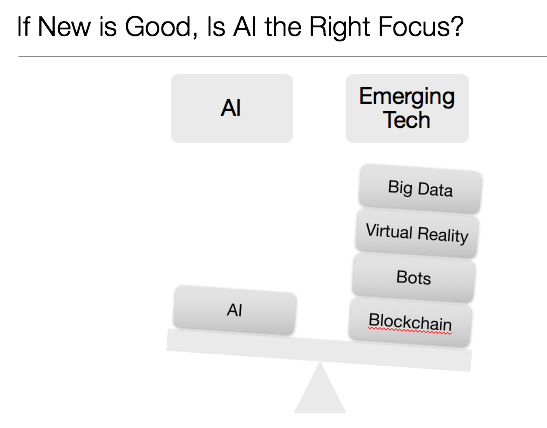How can in-house counsel gain the benefits of legal artificial intelligence (AI)? That is the question I answered on April 12, 2017 in a webinar for the Buying Legal Council, the trade organization for legal procurement. The slides are below; I present here a brief synopsis of my talk.
We have to start with a definition of AI. For that I rely on a tree diagram, courtesy of Michael Mills of Neota Logic. AI consists of multiple technologies, including machine learning, natural language processing, and expert systems.
Any rational consideration of AI must separate hype and reality. Many headlines promise legal robots but others make clear that the promise of AI will take time to realize. A study by an MIT economist and UNC law professor quantified the potential impact of AI on the legal market. Their paper, Can Robots Be Lawyers? Computers, Lawyers, and the Practice of Law, found that AI would have a limited impact on lawyer employment.
The main use cases for legal AI today are in eDiscovery document review, contract analytics, interactive legal advice, and legal research. Multiple law firms have publicly discussed evaluating, piloting, or using AI. If in-house counsel are doing so, they have not gone public about it to my knowledge. In-house lawyers should be aware of two other potential AI use cases: new accounting rules that change revenue recognition and move leases onto balance sheets.
Decision makers need to consider the use of AI in a broader context of both legal tech generally and the problems they are trying to solve. Since the advent of PCs and local area networks, uptake of core, practice, and management technology by lawyers has generally been relatively slow. A gimlet eye is required to consider whether AI uptake will be any faster or have more impact than the uptake of many other technologies (e.g., document authoring, deal management, or decision trees) or process frameworks such as knowledge management (KM) and legal project management (LPM).
As I have said on many occasions, however, I would love to be proved wrong about incremental uptake. I’m just looking at the evidence I see today. I encourage law departments and law firms to experiment with and evaluate AI to understand its potential and be ready to spring into action as needed. AI could well be like the advent of the Internet – not important until fairly suddenly, it is.
For AI evaluation, In-house counsel must consider both the technology itsself and the potential savings. Estimating savings is no easy task. Steps include: identify appropriate tasks, measure current unit costs, determine possible future unit cost with AI, run pilots to test, ensure adoption if successful, and track metrics regularly for potential adjustments. Evaluating technology requires empirical testing. Trying to compare back-end algorithms is a task best left to computer scientists and computational linguists. And it’s not clear they will agree. Keep in mind that rigorous empirical testing requires resources.
As the General Counsel or her procurement colleagues consider reducing legal cost and delivering more value, they must look not just at AI. I always advocate defining the problem to solve first, then look for technology. But for those who want to look at technology to start, they should consider other shiny new baubles, especially blockchain and Big Data. These likely hold as much promise as AI.
If the problem to solve is reducing legal cost, then in my view, the most effective approach is to avoid legal problems by practicing preventive law. (See my writings on this at #DoLessLaw (Twitter) and Do Less Law blog posts.) Technology can certainly help do less law: AI can advise in-house counsel via interactive systems; blockchain can reduce the need for contracts; and Big Data can likely identify systemic issues that give rise to avoidable legal costs.
In sum, if the goal is to reduce legal cost and legal risk and to deliver more value to in-house clients, then AI may be a big help but careful evaluation and planning is required.

Archives
Blog Categories
- Alternative Legal Provider (44)
- Artificial Intelligence (AI) (57)
- Bar Regulation (13)
- Best Practices (39)
- Big Data and Data Science (14)
- Blockchain (10)
- Bloomberg Biz of Law Summit – Live (6)
- Business Intelligence (21)
- Contract Management (21)
- Cool Legal Conferences (13)
- COVID-19 (11)
- Design (5)
- Do Less Law (40)
- eDiscovery and Litigation Support (165)
- Experience Management (12)
- Extranets (11)
- General (194)
- Innovation and Change Management (188)
- Interesting Technology (105)
- Knowledge Management (229)
- Law Department Management (20)
- Law Departments / Client Service (120)
- Law Factory v. Bet the Farm (30)
- Law Firm Service Delivery (128)
- Law Firm Staffing (27)
- Law Libraries (6)
- Legal market survey featured (6)
- Legal Process Improvement (27)
- Legal Project Management (26)
- Legal Secretaries – Their Future (17)
- Legal Tech Start-Ups (18)
- Litigation Finance (5)
- Low Cost Law Firm Centers (22)
- Management and Technology (179)
- Notices re this Blog (10)
- Online Legal Services (64)
- Outsourcing (141)
- Personal Productivity (40)
- Roundup (58)
- Structure of Legal Business (2)
- Supplier News (13)
- Visual Intelligence (14)
